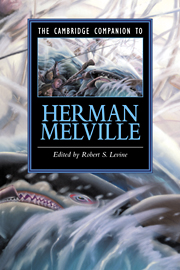Book contents
- Frontmatter
- Introduction
- 1 “Race” in Typee and White-Jacket
- 2 The Tambourine in Glory
- 3 Moby-Dick as Revolution
- 4 Pierre's Domestic Ambiguities
- 5 A----!
- 6 Melville the Poet
- 7 Melville's Traveling God
- 8 Melville and Sexuality
- 9 Melville, Labor, and the Discourses of Reception
- 10 Bewildering Intertanglement
- 11 Melville and the Avenging Dream
- Afterword
- Selected Bibliography
- Index
- Series List
3 - Moby-Dick as Revolution
Published online by Cambridge University Press: 28 May 2006
- Frontmatter
- Introduction
- 1 “Race” in Typee and White-Jacket
- 2 The Tambourine in Glory
- 3 Moby-Dick as Revolution
- 4 Pierre's Domestic Ambiguities
- 5 A----!
- 6 Melville the Poet
- 7 Melville's Traveling God
- 8 Melville and Sexuality
- 9 Melville, Labor, and the Discourses of Reception
- 10 Bewildering Intertanglement
- 11 Melville and the Avenging Dream
- Afterword
- Selected Bibliography
- Index
- Series List
Summary
TWO MOBY-DICKS: LEGEND AND FORM
Legend has it that there are two Moby-Dicks. The story varies, depending upon who tells it, but the facts behind this theory of composition are constant. Returning home in February 1850 from London, where he had peddled White-Jacket, Melville contemplated basing his sixth book on the neglected Revolutionary War hero Israel Potter. He had retrieved Potter's autobiography from a London bookstall and thought a narrative of the luckless patriot (like that of alienated White-Jacket) would allow him to question democratic hero worship and revolution itself. But the heated events of 1848 might have persuaded him to avoid politics for a while. He put Potter and the seeds of his revolutionary critique aside and turned to what he told his British publisher, Richard Bentley, would be nothing more than “a romance of adventure founded upon certain wild legends in the Southern Sperm Whale Fisheries.”
Melville began this new book by writing out of himself. Still, he was quick to invent. Although he could describe the ports of Manhattan and New Bedford from personal experience, he had never been to Nantucket, so he made his own Nantucket. And even though he would be on more familiar "ground" when his narrative took to sea, he knew enough about whaling to know that he did not know it all: not its history, science, practices, or lore. Inevitably, he needed facts. He got himself a library card, checked out William Scoresby's tome on whaling, and began mixing fact and fancy. Or, as he put it on May Day 1850 to Richard Henry Dana, Jr., this "strange sort of book" would pull "poetry" out of "blubber." Given "the nature of the thing," it must itself be as "ungainly as the gambols of the whales themselves" (Correspondence, 162). Moreover, "the thing" was already halfway done, so that when he wrote Bentley on June 27, he said it would be ready for publication by late autumn. The "thing" was Moby-Dick.
- Type
- Chapter
- Information
- The Cambridge Companion to Herman Melville , pp. 65 - 90Publisher: Cambridge University PressPrint publication year: 1998
- 4
- Cited by



